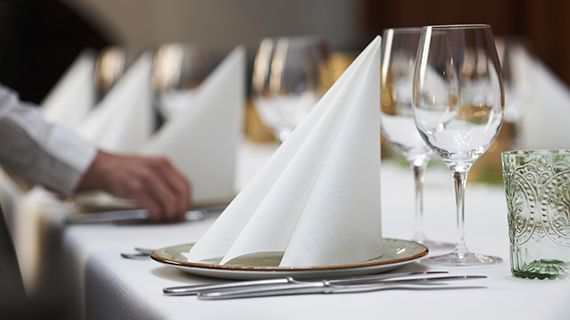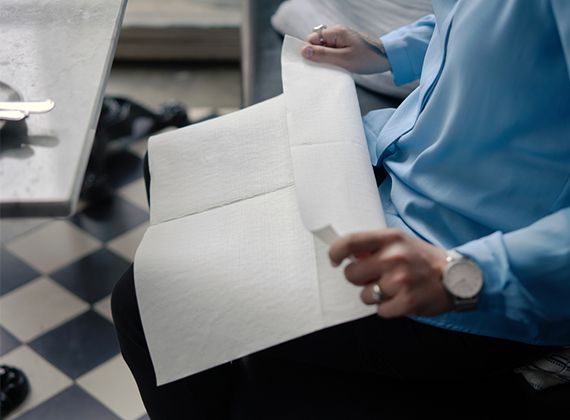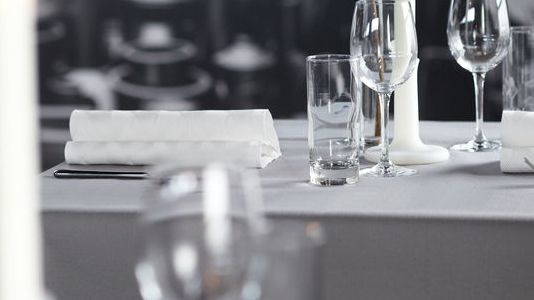
Blog post -
Are Paper Napkins Bad For The Environment?
With a prominent focus on the environment in recent years, a trend that only seems likely to continue as awareness increases, a common debate in the hospitality industry is whether linen or disposable tableware is more environmentally friendly over its average lifespan.
Over the past few decades, traditional linen has been long regarded the favourite with its reusability however, with major advances in modern technology and more sustainable materials, it is becoming harder to distinguish between the look and feel of real linen and their paper counterparts. So, the question comes down to which is more favourable for the environment?

The Manufacture Process
Assuming an average material weight of 4 grams for disposable paper napkins and 35 grams for linen napkins, (the exact weight is likely to vary but, the relative weights will remain consistent), the manufacture of paper napkins results in a lower greenhouse gas emission of 10 grams, using 0.3 litres of water in comparison with linen napkins which create 112 grams of greenhouse gas emissions and requires 22 litres of water.
Laundry
Based on an average washing machine, each traditional linen napkin will create a further 5 grams of greenhouse gas emission through the electricity used by the appliance, and ¼ litres of water. In addition, laundry detergent and bleach (to maintain the typical bright white look of linen) may have downstream impacts on aquatic wildlife. Drying linen napkins creates another 10 grams of greenhouse gases unless the tableware is air-dried which, is unlikely to happen in a fast-paced hospitality industry. One of the major advantages of paper napkins is that you don’t incur any emissions, water use, or hassle from laundry.
If you add up the emission output from growing the raw materials, manufacturing, and maintaining the product, the paper napkin is the clear winner with 10 grams of greenhouse gas emissions compared to 127 grams for linen but, we need to take into account usage when calculating the environmental impact over an average lifespan.
Usage
In the hospitality industry, we can make a broad assumption that linen napkins are too worn out and soiled for further use after 50 cycles. With this assumption, the emissions for a linen napkin are 18 grams per use, with water being 0.7 litres respectively. Emissions and water use for paper napkins remain constant at 10 grams and 0.3 litres.
Conclusion
In a restaurant scenario with high usage, the paper napkin emerges as the clear environmentally friendly winner when compared with traditional linen. From production to end of life.
There are other distinct advantages to using paper products over linen.
- Lower initial purchase cost and maintenance.
- Improved hygiene due to reduced touchpoints e.g., not transferring table coverings to professional laundry services but, rather opening a clean sterile new set of paper napkins when resetting your restaurant tables.
- Flexibility. With linen, you’re restricted to your original restaurant design due to the high expense of replacing napkins and table covers. Paper napkins allow you to change your look for specific occasions, seasonally or for a complete venue redesign.
- Customisation, easily brand your tables to provide a seamless experience for your guests and raise your brand awareness. An option not typically offered with traditional linen tableware due to the high cost.
- Reduced electricity and carbon footprint
- FSC® certified tissue, sourced from sustainable forests.
- BIO Materials are Home compostable, improved end-of-life options.
- Utilises food waste to remove plastic from the products entirely.
- 100% recyclable packaging, recycle with paper or cardboard.
- Industry first with fossil-free products, global market leader.
- Forward-thinking – stay ahead of UK sustainability legislation changes.
All our table covers, napkins, placemats, and napkin pockets are FSC®-certified. This means that the raw materials we use to manufacture our disposable table solutions are all sourced from sustainable forests, that are managed in a way that meets the social, economic, and ecological needs of present and future generations.
Keep an eye out for our Bio Dunisoft® & Dunicel® napkins and table covers launching in January 2022 - the next generation of sustainability for the hospitality industry. The fossil-free disposable products utilise renewable bio-based materials such as lemon peel, corn, and potato starch.
Credit:
Original Article by Pablo Paster at Treehugger.
Research conducted by James Norman, Director of Research at Planet Metrics.

